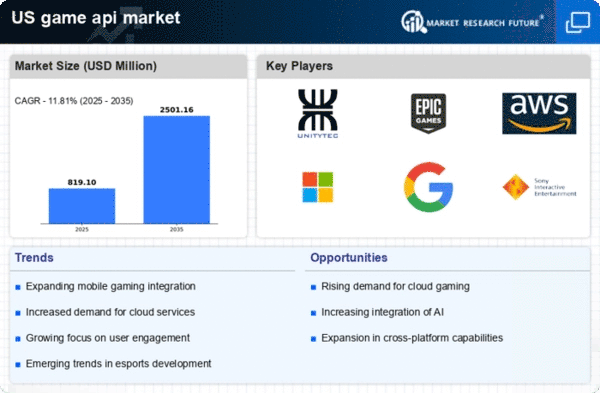Expansion of Esports
The game api market is significantly influenced by the rapid expansion of esports, which has transformed competitive gaming into a mainstream entertainment phenomenon. In 2025, the esports industry in the US is projected to generate revenues exceeding $1 billion, highlighting its lucrative potential. This growth is prompting game developers to create APIs that support live streaming, real-time analytics, and player engagement features. As esports tournaments gain popularity, the demand for sophisticated game api solutions that can handle large-scale events and provide seamless user experiences is increasing. Furthermore, partnerships between game developers and esports organizations are likely to foster innovation in the game api market, as they seek to enhance the competitive landscape and attract a broader audience.
Surge in Mobile Gaming
The game api market is experiencing a notable surge in mobile gaming, which has become a dominant force in the industry. As of 2025, mobile gaming accounts for approximately 50% of the total gaming revenue in the US, indicating a shift in consumer preferences towards portable gaming experiences. This trend necessitates robust APIs that can support various mobile platforms, enabling developers to create seamless and engaging applications. The increasing number of mobile gamers, projected to reach over 200 million in the US by 2026, further emphasizes the need for innovative game api solutions. Consequently, companies are investing heavily in developing APIs that enhance user experience and facilitate cross-platform compatibility, thereby driving growth in the game api market.
Adoption of Augmented Reality (AR)
The game api market is witnessing a growing adoption of augmented reality (AR) technologies, which are reshaping the gaming landscape. As of 2025, the AR gaming segment is expected to reach a valuation of $10 billion in the US, driven by advancements in mobile devices and AR software. This trend is compelling developers to integrate AR capabilities into their games, necessitating the development of specialized APIs that can facilitate these features. The ability to blend digital content with the real world enhances user engagement and creates immersive experiences. Consequently, the demand for innovative game api solutions that support AR functionalities is likely to rise, positioning the game api market for substantial growth in the coming years.
Increased Focus on User Engagement
The game api market is increasingly characterized by a heightened focus on user engagement strategies. Developers are recognizing the importance of retaining players and enhancing their gaming experiences, leading to the implementation of APIs that facilitate personalized content delivery and social interactions. As of 2025, studies indicate that games with integrated social features see a 30% increase in player retention rates. This trend is prompting companies to invest in game api solutions that enable real-time communication, community building, and tailored content. By fostering a more interactive gaming environment, developers can enhance user satisfaction and loyalty, thereby driving growth in the game api market.
Emergence of Subscription-Based Models
The game api market is experiencing a shift towards subscription-based models, which are becoming increasingly popular among consumers. As of 2025, it is estimated that subscription services will account for over 40% of the gaming revenue in the US. This trend is encouraging developers to create APIs that support subscription management, content delivery, and user analytics. By offering players access to a wide range of games for a fixed monthly fee, companies can enhance customer retention and attract new users. The rise of subscription models is likely to drive innovation in the game api market, as developers seek to create seamless experiences that cater to the evolving preferences of gamers.
















